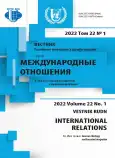Searching for an Economic Basis for the Indo-Pacific: Evolution of India’s Approaches
- Authors: Kupriyanov A.V.1
-
Affiliations:
- Primakov National Research Institute of World Economy and International Relations, Russian Academy of Sciences
- Issue: Vol 22, No 1 (2022): Eurasian Ideology and Eurasian Integration
- Pages: 153-165
- Section: PEACE AND SECURITY
- URL: https://journal-vniispk.ru/2313-0660/article/view/320569
- DOI: https://doi.org/10.22363/2313-0660-2022-22-1-153-165
- ID: 320569
Cite item
Abstract
The article is devoted to an analysis of India’s attempts to form an economic basis for its flagship foreign policy initiative - the concept of the Indo-Pacific. The author, using a multidimensional approach based on critical theory, historical sociology of international relations, the strategic culture approach and spatial approach, examines the evolution of the economic system of the Indo-Pacific in a historical perspective. India has historically played a key role in the system. So the Indian political elites believe that it has to be the regional hegemon. The rapid growth of the Indian economy at the beginning of the 21st century allowed New Delhi to start implementing its ambitions. The growth of neighboring China and its expansion into traditional Indian spheres of influence forced India to intensify the Indo-Pacific policy. Possible options for building the economic basis of the Indo-Pacific have been consistently explored in the article. The author highlights the economic mega blocs (TPP and RCEP), which India refused to join due to concerns about its economy; sub-regional trade and economic blocs and initiatives (SAARC, BIMSTEK, SAGAR, AAGC), local and relatively weak for providing the economic basis of the mega-region on their basis; finally, the latest infrastructure projects (Blue Dots Network, Build Back Better World), in which India is still hesitant to participate, not being sure of their effectiveness and fearing excessive involvement in anti-Chinese projects. The author concludes that India can either join Western infrastructure initiatives, or try to build an economic basis for the Indo-Pacific on a set of sub-regional initiatives. In the latter case, Russia could play an important role by implementing bilateral projects with India and participating in multilateral ones.
About the authors
Alexey V. Kupriyanov
Primakov National Research Institute of World Economy and International Relations, Russian Academy of Sciences
Author for correspondence.
Email: a.kupriyanov@imemo.ru
ORCID iD: 0000-0002-9041-6514
PhD in History, Head of Group on South Asia and Indian Ocean of Centre for Asia Pacific Studies
Moscow, Russian FederationReferences
- Abu-Lughod, J. L. (1989). Before European Hegemony: The world system A.D. 1250-1350. New York, Oxford: Oxford University Press.
- Alpers, E. A. (2014). The Indian Ocean in world history. Oxford: Oxford University Press.
- Blah, M. (2018). China’s Belt and Road Initiative and India’s concerns. Strategic Analysis, 42(4), 313-332. https://doi.org/10.1080/09700161.2018.1482631
- Bragina, E. A. (2020). India’s economy under pressure from COVID-19. Outlines of Global Transformations: Politics, Economics, Law, 13(5), 128-144. (In Russian). https://doi.org/10.23932/2542-0240-2020-13-5-8
- Chan, L.-H. (2020). Can China remake regional order? Contestation with India over the Belt and Road Initiative. Global Change, Peace & Security, 32(2), 199-217. https://doi.org/10.1080/14781158.2020.1772215
- Chetty, A. L. (2007). India’s role in BIMST-EC: Prospects and problems. In T. N. Devi (Ed.), India and Bay of Bengal community, the BIMSTEC experiment: Bangladesh - India - Myanmar - Sri Lanka - Thailand economic cooperation (pp. 40-59). New Delhi: Gyan Publishing House.
- De, P. (2020). Act East to Act Indo-Pacific: India’s expanding neighbourhood. New Delhi: KW Publishers.
- Doyle, T., & Rumley, D. (2019). The rise and return of the Indo-Pacific. Oxford: Oxford University Press. https://doi.org/10.1093/oso/9780198739524.001.0001
- Gaur, P. (2020). India’s withdrawal from RCEP: Neutralising national trade concerns. Journal of the Asia Pacific Economy. https://doi.org/10.1080/13547860.2020.1809772
- Khurana, G. S. (2007). Security of Sea lines: Prospects for India - Japan cooperation. Strategic Analysis, 31(1), 139-153. https://doi.org/10.1080/09700160701355485
- Krupakar, J. (2017). China’s naval base(s) in the Indian Ocean - signs of a maritime grand strategy? Strategic Analysis, 41(3), 207-222. https://doi.org/10.1080/09700161.2017.1296622
- Lebedeva, N. B. (2018). The Indian Ocean - Challenges of the 21st century and India. Moscow: IV RAN publ. (In Russian).
- Maniyar, J. (2020). Japan in the Indian Ocean: An integral and holistic involvement in South Asia. Maritime Affairs: Journal of the National Maritime Foundation of India, 16(1), 98-109. https://doi.org/10.1080/09733159.2020.1785032
- Metcalf, T. (2007). Imperial connections: India in the Indian Ocean arena, 1860-1920. Berkeley: University of California Press.
- Mohan, C. R. (2013). Samudra Manthan: Sino-Indian rivalry in the Indo-Pacific. New Delhi: Oxford University Press.
- Paik, W., & Park, J. J. (2020). The Quad’s search for non-military roles and China’s strategic response: Minilateralism, infrastructure investment, and regional balancing. Journal of Contemporary China, 30(127), 36-52. https://doi.org/10.1080/10670564.2020.1766908
- Panda, J. P. (2014). Factoring the RCEP and the TPP: China, India and the politics of regional integration. Strategic Analysis, 38(1), 49-67. https://doi.org/10.1080/09700161.2014.863462
- Panda, J. P. (2020a). Framing an Indo-Pacific narrative in India - South Korea ties. Academic Paper Series of Korea Economic Institute of America. Retrieved from http://www.keia.org/sites/default/files/publications/kei_aps_panda_200106.pdf
- Panda, J. P. (2020b). India, the Blue Dot Network, and the “Quad Plus” calculus. The Journal of Indo-Pacific Affairs, 3(3), 3-22.
- Panikkar, K. M. (1945). India and the Indian Ocean: An essay on the influence of sea power on Indian history. London: Allen & Unwin.
- Sahoo, P., & Bishoi, A. (2016). Role of Japanese official development assistance in enhancing infrastructure development in India. Contemporary South Asia, 24(1), 50-74. https://doi.org/10.1080/09584935.2015.1135307
- Sinha, U. K. (2019). Regionalism as the new realism. In B. Debroy, A. Ganguly & K. Desai (Eds.), Making of New India: Transformation under Modi government (pp. 465-473). New Delhi: Wisdom Tree.
- Thankachan, S. (2017). Japan’s “Free and Open Indo-Pacific Strategy”: Reality before the rhetoric? Maritime Affairs: Journal of the National Maritime Foundation of India, 13(2), 84-91. https://doi.org/10.1080/09733159.2017.1414831
- Volodin, A. G. (2017). India in the world of regionalization. Outlines of Global Transformations: Politics, Economics, Law, 10(4), 178-191. (In Russian). https://doi.org/10.23932/2542-0240-2017-10-4-178-191
Supplementary files









